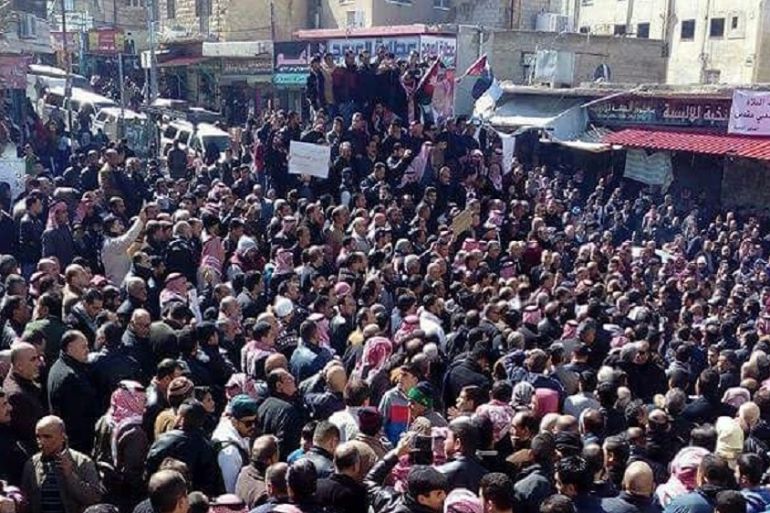Jordanians ‘at breaking point’ over austerity measures
A government increase in sales tax has affected poor and middle-class families, activists say.

Amman – Protests are erupting across Jordan in response to rising prices and the government’s decision to raise taxes on food items and services that was enacted last week.
On Saturday, protests that broke out in the southern city of Karak sparked similar protests in the southern city of Tafilah, Salt, and Madaba. Several hundred people gathered in Karak, 90km south of Amman, calling for the resignation of the Prime Minister Hani Mulki and an end to what they called a “government of taxes”.
Keep reading
list of 4 itemsUN Security Council passes motion denouncing attacks on aid workers
UK’s Sunak says no Rwanda deportation flights before election
Israel’s war on Gaza: Rights groups urge Biden to oppose threats to ICC
“We are suffocated by the government’s continuous approach to solving [dire] economic conditions by turning to people’s pockets,” Muath Batoush, a protester from Karak, told Al Jazeera, referring to increasing prices and taxes. Protesters chanted slogans such as “Leave Mulki”, “Shame on you, you have sold the country for a dollar”, and “We cannot pay the bills for the corrupt.”
On January 23, the Jordanian parliament approved the 2017 budget, which seeks to raise $643m in additional taxes and tariffs.
READ MORE – Jordan: ‘We are tired of living like the dead’
”We
economic conditions by turning to people’s pockets.”]
Earlier this month, the government decided to raise fuel prices raised sales tax on several commodities and telecom services ranging from eight to 16 percent.
The government’s move comes as Jordan tries to reduce its budget deficit of 827 million Jordanian dinars ($1.2bn) as part of its economic reform agreement with the International Monetary Fund. In July 2016, Jordan signed a 36-month IMF programme providing it with access to $700m in loans.
During a recent interview with state TV, Mulki said that only 30 percent of basic commodities will be affected by the tax increase so as “not to touch middle and poor Jordanians”.
But activists disagree. They argue that the increased sales tax has affected poor and middle-class families, calling on the government to instead fight corruption and hold those accountable to reclaim what they believe are embezzled state funds.
“Jordan’s budget deficit could be paid by returning embezzled state funds from just a couple of corrupt people if their cases are properly investigated,” said Omar al-Masri, a protester from Tafilah.
|
|
Jordan’s economy has been affected by the deteriorating regional security situation, following a wave of popular uprisings that swept across neighbouring countries and resulted in an influx of more than a million refugees into the country. Jordan is reliant on aid money from Gulf countries.
In 2011, Gulf states pledged $5bn to Jordan in the aftermath of the Arab Spring. But the aid package expired at the end of 2016 and there are no signs that the GCC is planning to renew it.
According to official figures, unemployment rates have risen to 15.8 percent and even higher outside Amman, where job opportunities are limited.
A recent study by the National Society for Consumer Protection, a Jordanian watchdog, indicates that 61.2 percent of Jordanians feel pessimistic about the country’s economic situation and that 58.8 percent reported a decline in their living conditions.
Previous unrest in Jordan has originated in the south, such as the 1996 bread riots following the economic woes stemming from the 1991 Gulf War. Karak and Maan were also home to the “April Uprising” in 1989 when riots broke out in response to rising prices.
|
|
Batoush, who holds a master’s degree and has been working as a school teacher for 20 years, said his salary does not exceed 500 dinar (roughly $700). His monthly rent has drastically risen to 200 dinar ($280). “Most people spend their salaries in two days and just try to get by for the rest of the month,” the 42-year-old told Al Jazeera.
He considers himself luckier than many educated Jordanians who remain unemployed: “Every home in Karak has at least two to three university degree holders who are unemployed,” Batoush said.
Jordanian commentator Majid Toubeh says protesters’ anger is the accumulation of years of frustration with government’s economic policies – a series of austerity measures and tax increases that have failed to revive the economy. “It is a sign that people are fed up. The living conditions of poor Jordanians and what is left of the shrinking middle class has become unbearable,” Toubeh told Al Jazeera, warning that it could lead people to “a breaking point”.
On Tuesday, Jordan’s Retied Military Veteran Association backed the protests in a statement and called on the current government to resign.
“We demand the formation of a new government that empowers Jordanians as the source of legitimacy in the country in accordance with the constitution,” said the statement. It called for ‘an immediate legal action against corruption cases’.
Batoush, who participated in the Hirak, Jordan’s Arab Spring-inspired street protests in 2011, warns that frustration among protesters is higher than in previous years.
“Once agitated people go to the streets, they will never come back,” he warned.